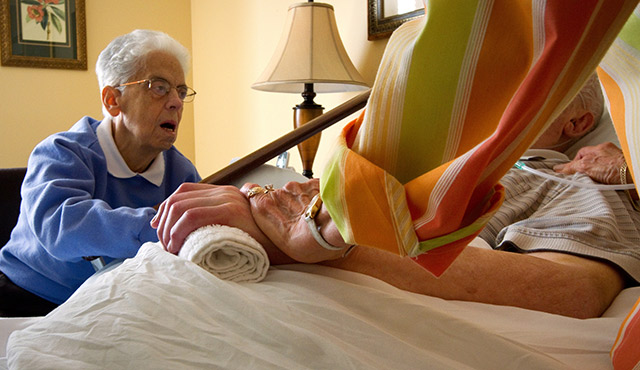As I reflected on in my last writing, I recently had to return to Springfield, Ill., to go through our family home one last time before it was sold. My sister and I walked through it and had a wonderful chance to visit about our parents and all that they had done for us. I found a few more of my mother’s prayer cards and those of my father as well. As my brother Les said when some of our family was here for my father’s memorial Mass, my sister is truly a “heroine” for having made sure that my parents were able to be in their home until the very end of their lives, through the many challenges of their illnesses. Both of them passed away from the effects of Parkinson’s disease. I wrote about my father’s journey through the last days of this debilitating illness, and because we are close to the anniversary of my mother’s death in 2012, I was thinking of her last days as well; they were very similar.
Both of those experiences (and many others I’ve had as a pastor) taught me the absolute blessing of palliative and hospice care to make sure that there is no pain for those in their last days and also ensuring that they are cared for and not alone. My personal experience with my parents is one of the many reasons that I was very concerned about SB 128 and wanted to work with the broad-based coalition Californians Against Assisted Suicide.
Like Archbishop Gomez, I too am grateful for the thoughtful reflection that the State Assembly’s Health Committee members gave to this complex issue. This is not a “Catholic issue” even though it is being framed as such. Physician-assisted suicide involves fundamental questions of human dignity and social justice. The elderly, the poor, those living in immigrant and minority communities, and the handicapped are especially vulnerable to this type of legislation. Not long ago, a woman from another country introduced me to her two autistic sons, and thanked us for being the voice for them.
When Bishop Robert McElroy was installed as the Bishop of San Diego, he used a very powerful image of “accompaniment”: that is, a diocesan bishop is to accompany his people in their journey of faith. That applies to each and every one of us. Catholic teaching is often caricatured as a series of “no”. However, every “no” actually means a “yes”. In continued reflection on this critical part of life, we can ask ourselves how to say “yes” when accompanying those who are suffering or in pain. A “no” to this bill means a “yes” that opens the door for every one of us to know and journey with those friends and family of ours who are in their last days so they are not alone. A “no” to this bill means a “yes” to doing all that we can to help ensure that our voices may be raised in support of quality palliative care for all. It also means a “yes” to be part of a community of love and concern for all those whom we know and love to their very last breath.
As I think of my mother and father again, I reflect on these words of Archbishop Gomez: “California has a long and proud tradition of leadership in promoting human dignity and access to health care for everyone living in our great state. In that spirit, I pray that we can come together as people of good will to seek the solutions—in medical training, geriatrics, palliative treatment and other areas–that can truly improve the compassionate care of terminally ill patients and those at the end of life.”
Finally, it would be well for us, when we have the chance, to acknowledge the work of the members of the Assembly, in their service for the common good and in facing difficult issues such as this.
The Most Reverend Kevin W. Vann, Bishop Of Orange

